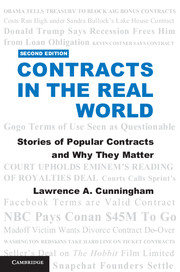Book contents
- Frontmatter
- Dedication
- Contents
- Annotated Contents
- Acknowledgments
- Introduction
- 1 Getting In: Contract Formation
- 2 Facing Limits: Unenforceable Bargains
- 3 Getting Out: Excuses and Termination
- 4 Paying Up: Remedies
- 5 Rewinding: Restitution and Unjust Enrichment
- 6 Writing It Down: Interpretation, Parol, Frauds
- 7 Performing: Duties, Modifi cation, Good Faith
- 8 Hedging: Conditions
- 9 Considering Others: Third Parties and Society
- Conclusion
- Appendix A Offering and Accepting
- Appendix B Buying and Selling Goods
- Notes
- Table of Cases
- Index
6 - Writing It Down: Interpretation, Parol, Frauds
Published online by Cambridge University Press: 05 March 2016
- Frontmatter
- Dedication
- Contents
- Annotated Contents
- Acknowledgments
- Introduction
- 1 Getting In: Contract Formation
- 2 Facing Limits: Unenforceable Bargains
- 3 Getting Out: Excuses and Termination
- 4 Paying Up: Remedies
- 5 Rewinding: Restitution and Unjust Enrichment
- 6 Writing It Down: Interpretation, Parol, Frauds
- 7 Performing: Duties, Modifi cation, Good Faith
- 8 Hedging: Conditions
- 9 Considering Others: Third Parties and Society
- Conclusion
- Appendix A Offering and Accepting
- Appendix B Buying and Selling Goods
- Notes
- Table of Cases
- Index
Summary
A verbal contract ain't worth the paper it is written on.
– Samuel GoldwynPlain Meaning I: Eminem's Digital Records
In 1998, the rap artist Eminem, whose real name is Marshal Mathers, and his producer signed an exclusive record contract with Aftermath Records, a record label unit of Vivendi. The rapper's record sales soared throughout the next decade, earning many millions, and filmmakers used his music in movies, yielding millions more. The 1998 contract requires the label to pay the star up to 20 percent of receipts for selling records the old-fashioned way: on vinyl, tape, or disc. It also clearly promises the artist 50 percent of the royalties on licenses of his music marketed in other ways, such as on movie soundtracks.
In 2001, the label began marketing music in a lucrative new way of distributing songs: digitally. The richest deal was a 2002 contract with Apple Computer for distribution on its iTunes products, both in stores and over the Internet. iTunes are permanent downloads of music, consisting of digital copies of recordings that, once downloaded, stay on a user's computer until deleted. Beginning in 2003, the label also formed other profitable contracts with cell phone service providers, which distribute recordings as “mastertones.” These include short clips of songs that can be bought to signal incoming calls known as ringtones. In paying Eminem for all these digital deals, the label applied the 1998 contract's 20 percent royalty rate for sales. In 2006, however, Eminem's team objected that, instead, the 50 percent royalty for licenses governed these sales. The difference, which depended on what their written contract meant, added up to many millions of dollars.
The 1998 contract's “Records Sold” provision directs royalties of up to 20 percent of the adjusted retail price of all “full price records sold through normal retail channels.” Exactly what percentage applied varied according to how many sales were made, called an “escalation clause” because royalty rates escalate with higher sales. The phrase “normal retail channels” is not defined. Next in the contract is a “Masters Licensed” provision, which directs that: “Notwithstanding the foregoing,” royalties of 50 percent of the label's net receipts are due “[o]n masters licensed to others for the manufacture and sale of records or for any other uses.” […]
- Type
- Chapter
- Information
- Contracts in the Real WorldStories of Popular Contracts and Why They Matter, pp. 144 - 174Publisher: Cambridge University PressPrint publication year: 2016



